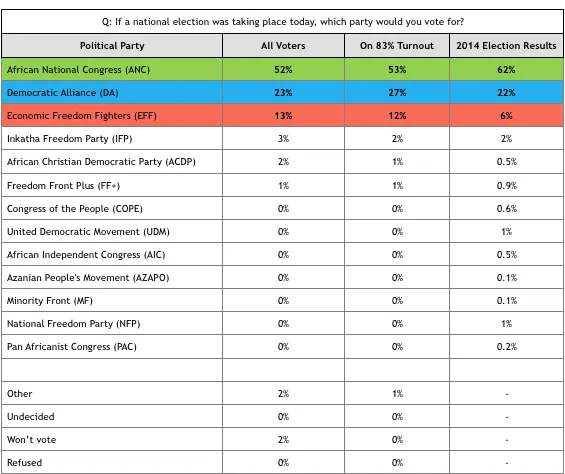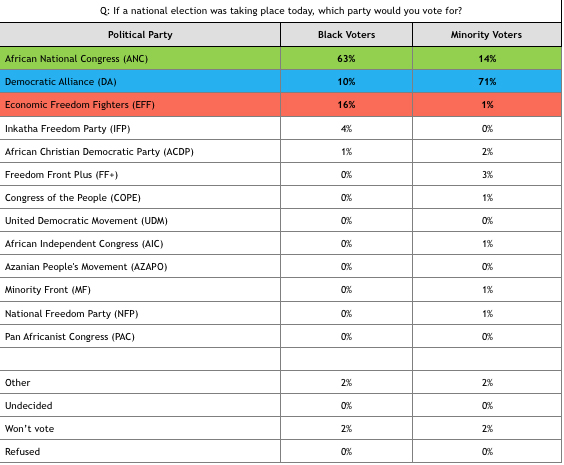The starter gun’s been fired on Election 2019.
Speaking in New York on Monday, President Cyril Ramaphosa announced the approximate date for what the DA calls a watershed election. And Msimanga will fight its toughest battle.
A new poll out by the Institute for Race Relations (IRR) at the weekend shows that the smallest, richest central province of South Africa will be the battleground in the 2019 poll.
Right now, there is no outright winner in the race for Gauteng: the ANC is polling at under 46%, while the DA is at 28% support – way down on the party’s ambitions of making a clean win. The DA has staked its 2019 campaign on Gauteng; it has moved its headquarters from Cape Town to Johannesburg to symbolise its great trek north, but also its trek from a largely white support base to a black one.
The IRR poll shows that support for the radical EFF is at 24% in Gauteng. The pugnacious newcomer is likely to cement its role as a kingmaker party. In 2016, the EFF held the casting coalition vote in Johannesburg, Pretoria and Nelson Mandela Bay.
The IRR poll showed that the DA appears to have lifted its national support to 23% from its 2014 national election result of 22%.

Table 1.1: Voting Intention [All Voters] -The Criterion Report (IRR)
If the voter turnout in 2019 is poor, it will favour the DA.
Gareth van Onselen, the head of politics and governance at the IRR. who commissioned the poll, says:
“If one cross-references the turnout model by race, the poll found that of those 83% respondents ‘highly likely’ to vote, the percentage of minority voters jumped from 11% to 17%” because the targeted “minority” voters are more motivated voters.
At the party’s campaign launch on Saturday, looking for a white, coloured or Indian voter was like looking for a needle in a haystack. The music choices were not careful crossover as in previous campaigns, but black stars like Shekinah and Distruction Boyz played live. Most of the party’s premier candidates are black and so are the ambassadors of its key election themes.
The DA is fighting for a black vote in the 2019 election, working on the assumption that its core voter base is sealed. This electorate has expressed a 71% intention to vote DA in 2019, but polls can still move between this and the election date.
This may help explain why the DA fielded a technocrat in the Western Cape. Its premier candidate, Alan Winde, is not a charismatic figure on the stumps, but he has a solid history of delivering economic development in the Western Cape. And how well is the DA doing at attracting black voters?
Van Onselen has found that “the DA dominates the electoral share of the market among minority voters, while its share of black voters appears to have increased, from approximately 6% of all black voters in 2014 to 10%”.
The party will fight a campaign waged against corruption.

Table 1.3: Voting Intention [Black Voters/Minority Voters] – Criterion Report (IRR)
The spokesperson for this campaign will be Phumzile van Damme while Natasha Mazzone will campaign against State Capture. When DA leader Mmusi Maimane diagnosed the problem, he used the rhetoric of the streets.
“You may pay a bribe to get a government job. Or you must sleep with someone,” he said to shouts of “Yes!” from an audience that was largely young and black.
“We’ve lost our way,” said Maimane.
“How easy it is to steal money from our people,” he said to more shouts of agreement.
While land reform is top of the news, the IRR poll has found that jobs, unemployment and crime are much bigger issues for ordinary people, so those economic issues are likely to take up a bigger part of the party’s stump time rather than land. On land, the DA has chosen to campaign on title deeds, rather than on state-led land reform.
The DA’s 18 Strategic Resolutions
In April 2018, the DA’s Federal Congress adopted 18 “strategic resolutions” that will form the basis of its election manifesto.
“The adoption of these resolutions clearly places those left behind – particularly the jobless – as the DA’s number one priority,” Maimane said at the time.
These resolutions include:
Jobs and the economy: The introduction of a jobseekers’ allowance for young unemployed people; a National Civilian Service year that would provide work experience for matriculants without jobs, and the expansion of the Expanded Public Works Programme.
Land: A commitment “to protecting not only clause 25 of the Constitution but the inclusive and continuous extension of private property rights to those excluded in the past”; “ensuring that those entitled to land receive it in the form of direct ownership with adequate support to be economically successful”; providing tenure to people who live on communal land, and the transfer of “superfluous state land” to the homeless.
Housing: A commitment to giving people title deeds; the creation of a single, national housing list, and increased access to affordable housing opportunities including a home voucher scheme that would give the recipient a R150,000 voucher to build a home on a serviced site provided by the government or that could be used as a deposit on an existing house.
Basic education: Providing online and digital learning platforms to all schools; introducing teacher training colleges in all provinces; establishing a national education inspectorate, and ensuring that relevant experience is required when making senior appointments.
Higher education and training: “Expand access to tertiary institutions with the rollout of a range of online courses and programmes in a variety of fields in collaboration with existing universities and colleges”; introducing “a new funding model to guarantee that no deserving student is unable to study because they cannot afford it”, and the introduction of college vouchers “to allow deserving students to choose their preferred [Technical and Vocational Education and Training] college and qualification based on scarce and critical skills”.
Health: The introduction of an expanded clinic building programme in under-served areas; and providing mobile clinics for settlements outside a 5km radius from public health facilities.
National Minimum Wage: The party rejects “a blanket National Minimum Wage in its current form”. It supports sectoral minimum wages. DM


















 Become an Insider
Become an Insider